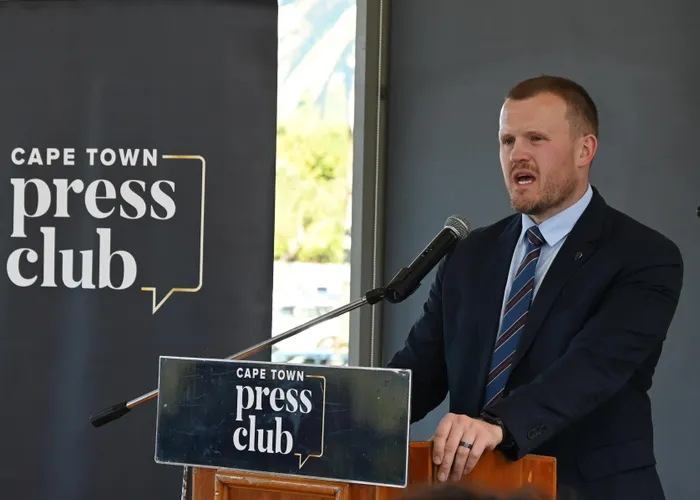Ian Cameron calls for urgent police devolution amid SAPS crisis

Ian Cameron, Democratic Alliance MP and chairperson of Parliament’s Portfolio Committee on Police, addressing the Cape Town Press Club about Lieutenant-General Nhlanhla Mkhwanazi's explosive allegations.
Image: Ayanda Ndamane / Independent Media
Parliament’s Police Portfolio Committee chairperson, Ian Cameron, has hinted that the Democratic Alliance (DA) will formally propose the devolution of policing powers to the Western Cape in its upcoming engagements with the Acting Minister of Police, Firoz Cachalia.
Cameron was speaking at the Cape Town Press Club on Tuesday during a discussion centred on explosive allegations made by KwaZulu-Natal Police Commissioner Lieutenant-General Nhlanhla Mkhwanazi.
He said the growing rot within the South African Police Service (SAPS), coupled with public distrust and ongoing instability, has amplified the urgency of decentralising policing.
“The rot that’s being exposed at SAPS and the uncertainty and the lack of trust from the public just shows how important the devolution argument really is. We need to decentralise. We need to make sure we create local detective capacity under metro police and Western Cape provincial authorities,” Cameron said.
He added that while the intention is not to take over policing, decentralisation would serve as a “huge force multiplier” for SAPS.
“This is not about the devolution of power and taking control of the police. People must understand that it could be a huge force multiplier for SAPS,” he said.
“Even if the organisation has all the political will, if they don’t have the budget or capacity to get the job done, why wouldn’t they share the power and decentralise some of their investigative capacity?”
Cameron argued that assigning metro police investigators to firearm-related matters on the Cape Flats would “multiply capacity and produce results”.
“Just regarding gun violence, if you take any firearm-related investigation and allow metro police investigators to work on those matters, surely it makes sense.”
He said the DA would engage with Home Affairs Minister Leon Schreiber on this proposal soon. “We will engage with the acting minister about the devolution of powers. I don’t know if he will make rash decisions very quickly, but it is certainly something to look at.”
Cameron also warned that SAPS is currently facing its most unstable period in two decades, as internal power struggles, leadership chaos, and serious allegations of political interference reach a boiling point.
He called Mkhwanazi’s recent claims that a powerful international drug cartel had infiltrated SAPS with protection from senior politicians, deeply troubling and deserving of urgent attention.
“This is not just another rogue element. It’s part of a much larger, long-simmering battle within Crime Intelligence, a battle for full control of the SAPS,” he said.
“If you control Crime Intelligence, you can control the police. And if you control the police, you can influence elections.”
Cameron confirmed that these claims align with the information the Police Portfolio Committee has been receiving behind closed doors for years, without clear answers.
“I’ve been briefed by General Fannie Masemola and Mkhwanazi himself. You hear about these things repeatedly, but the truth is always just out of reach.”
He described the reaction from the Presidency and SAPS national leadership to Mkhwanazi’s claims as “inadequate” and said it further deepened uncertainty.
“The president is burying his head in the sand. There has been no decisive action, no consolidated communication from SAPS. It’s chaos,” he said.
Cameron said leadership structures within SAPS have become so politicised that basic governance and accountability have collapsed.
“Many senior officers don’t even have proper security clearances. There are serious concerns about vetting processes, and institutions like the Philippi Police Academy, where millions were looted, still have the same command structure in place. That’s the institution training our future police.”
In the wake of Mkhwanazi’s statement, SAPS offered no coherent communication, said Cameron. “The minister was issuing WhatsApp press releases from his personal phone. The National Commissioner held a press conference to downplay parts of it. It created confusion and deepened mistrust.”
Cameron proposed a set of urgent reforms, including:
- An independent body to run lifestyle audits on SAPS senior management.
- A full-scale review of vetting and integrity management systems.
- A reconfiguration of SAPS training institutions.
- Greater resourcing and independence for the Independent Police Investigative Directorate (IPID); and
- A forensic skills audit of senior SAPS leadership.
“We are dealing with a situation where organised crime is flourishing, and that doesn’t happen without senior state involvement. South Africa is now ranked among the worst globally for organised crime. That should terrify us,” Cameron said.
He confirmed that Parliament has finalised a resolution for the establishment of an ad hoc committee to probe the SAPS crisis, which will soon be tabled in the National Assembly.
The committee will be mandated to investigate SAPS leadership failures, political interference, and the collapse of Crime Intelligence structures.
“We don’t want to duplicate what the commission of inquiry is doing, but Parliament is best placed to interrogate these matters with urgency. We cannot afford to let this slip back into silence.”
Cameron stressed that the committee must remain independent and free from factional influence. “People are already picking sides. That’s dangerous. The law must take its course, no matter who is implicated.”
He said the committee expects its work to take around three months, with continued oversight to ensure findings are implemented.
“We’ve seen this before: commissions that end with no consequences. This time, we must ensure that findings lead to arrests, dismissals, and full accountability.”
On the arrest in the DJ Sumbody murder case, Cameron said it will be interesting to see what the investigation reveals.
“It is interesting to me that this arrest happened within the same period of Mkhwanazi’s allegations,” he said.
“We’ll see what it exposes in terms of other involvement or any kind of ulterior motive.”
mandilakhe.tshwete@inl.co.za
Related Topics: